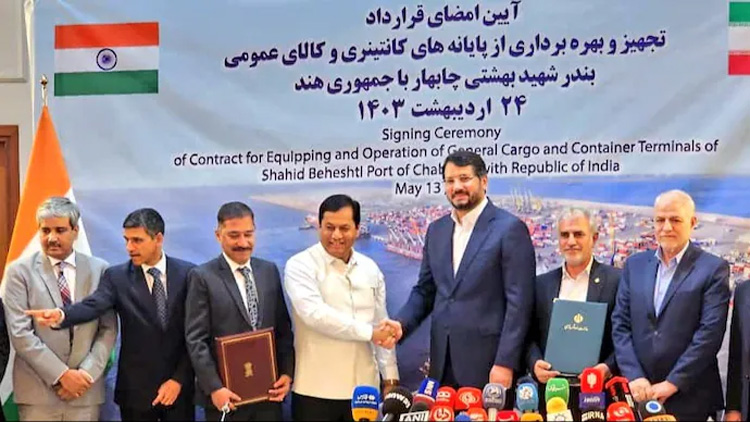India, Iran sign 10-year agreement for Indian operations at Chabahar port
India and Iran on Monday signed a long-term agreement covering Indian operations at the Chabahar port, with New Delhi offering a credit window worth $250 million for the development of infrastructure around the strategic facility in the Gulf of Oman.
The agreement was signed in Tehran in the presence of ports and shipping minister Sarbananda Sonowal and his Iranian counterpart Mehrdad Bazrpash.
Sonowal’s visit amid India’s general elections emphasises the importance attached by New Delhi to the Chabahar port and its place in ambitious plans to forge greater connectivity with Iran, Afghanistan and the landlocked central Asian states.
Sonowal said with the signing of the agreement, the two countries have laid the foundations for India’s long-term involvement in Chabahar.
“The signature of this contract will have a multiplier effect on the viability and visibility of Chabahar port,” Sonowal said. “Chabahar is not only the closest Iranian port to India, but it is also an excellent port from [a] nautical point of view.”
The long-term agreement, to be valid for 10 years and extended subsequently, was being negotiated by the two sides over the past three years and had been held up over differences on a clause related to arbitration. It replaces an initial pact inked in 2016 that covered India’s operations at the Shahid Beheshti terminal of Chabahar port and has been renewed annually.
India Ports Global Chabahar Free Zone (IPGCFZ), a subsidiary of state-run India Global Ports Limited (IGPL), currently operates the Shahid Beheshti terminal at Chabahar port.
Under the new contract between IPGL and the Ports and Maritime Organisation of Iran (PMO), the Indian state-run firm will invest about $120 million to further equip the Shahid Beheshti terminal, people familiar with the matter said on condition of anonymity.
The Indian side will procure equipment such as mobile harbor cranes, rail mounted quay cranes, rubber tyred gantry cranes, reach stackers, forklifts and pneumatic unloaders.
India has also offered a credit window equivalent to $250 million for mutually identified projects aimed at improving Chabahar-related infrastructure, the people said.
The Indian side handed over a letter from external affairs minister S Jaishankar to his Iranian counterpart Hossein Amirabdollahian regarding the credit window and reiterated India’s commitment to cooperate in developing the port, the Indian embassy in Tehran said in a post on X.
Sonowal and Bazrpash discussed “furthering the shared vision of making Chabahar port a regional connectivity hub connecting India to Afghanistan, Central Asia, and Eurasia”, the embassy said in another post.
Sonowal travelled from New Delhi to Tehran on a special Indian Air Force (IAF) and his delegation included JP Singh, the joint secretary who heads the Pakistan, Afghanistan and Iran desk in the external affairs ministry.
The move comes at a time when China has been showing greater interest in investments in ports and other coastal infrastructure in Iran, with Tehran pressing Beijing to take up the development of other terminals at Chabahar port.
Both India and Iran see the deep-water port in the Sistan-Baluchistan province as a hub for the International North-South Transport Corridor (INSTC), which will allow shipping companies to use an alternative route that bypasses the sensitive and busy Persian Gulf and Strait of Hormuz.
Chabahar’s location in the open sea provides easy and secure access for large cargo ships and the port has benefited from a carve-out from the US sanctions on Iran.
HT first reported in September 2022 that India and Iran were working on a long-term agreement for IGPL’s operations at Chabahar port. The only issue holding up the agreement at that time was related to the jurisdiction for arbitration of differences on any matter. Under Iran’s Constitution, such arbitration cannot be referred to foreign courts, and a proposal under the agreement required a constitutional amendment.
It was not immediately clear how the two sides worked out these differences, though Iranian officials told HT some time ago that this issue had been resolved. Iranian ambassador Iraj Elahi told HT last month the long-term agreement was ready and India’s ports and shipping minister was invited to Tehran for its signing.
Since IPGL began operations at Shahid Beheshti terminal in December 2018, it has handled more than 8.4 million tonnes of bulk and general cargo, including trans-shipments from Australia, Bangladesh, Brazil, Germany, Russia and the United Arab Emirates.
Chabahar has also facilitated the supply of humanitarian aid, especially during the Covid-19 pandemic. A total of 2.5 million tonnes of wheat and 2,000 tonnes of pulses have been trans-shipped from India to Afghanistan through Chabahar. In 2021, India supplied 40,000 litres of the pesticide Malathion to Iran through the port to fight a locust menace.
India took up the development of the Shahid Beheshti terminal under a tripartite agreement on Chahbahar signed with Iran and Afghanistan in May 2016. Afghanistan is effectively no longer part of the arrangements since the takeover of the country by the Taliban in 2021.
India had earlier pledged to invest $85 million in the terminal and has so far supplied six mobile harbour cranes (two of 140 tonnes and four of 100 tonnes capacity) and other equipment worth $25 million.
Sonowal said India’s investment in Chabahar will enhance the port’s capacity and efficiency and solidify New Delhi’s commitment to the region’s economic development. India’s sustained engagement in Chabahar underscores the port’s role as an anchor for Indian trade in the region, and the establishment of regular ship calls between Chabahar and Indian ports has “instilled stability and confidence among traders, offering them visibility and predictability in their supply chain operations”, he said.
Chabahar’s integration with a special free trade zone and India’s incentives such as concessions on vessel-related charges and cargo charges are aimed at attracting Indian entrepreneurs, he added.

